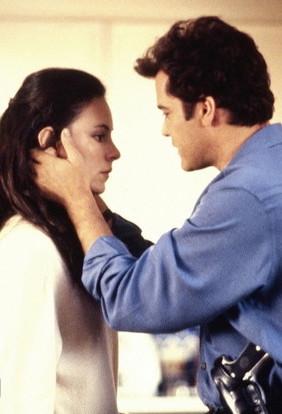Friday, June 26, 1992.
UNLAWFUL ENTRY. Written by Lewis Colick and Ken Friedman. Based on a story by George Putnam and John Katchmer. Music by James Horner. Directed by Jonathan Kaplan. Running time: 112 minutes. Restricted entertainment with the B.C. Classifier’s warning: "frequent gory violence, occasional nudity and suggestive scenes."
HOW DEEP IS YOUR RAGE?
To find out, take this simple test based on a situation that's key to the plot of the unsettling, ultimately disappointing new movie Unlawful Entry. Imagine yourself in the position of white, well-off Los Angeles homeowner Michael Carr (Kurt Russell).
Two nights ago, you stood helpless in your kitchen while an intruder held a knife to the throat of your beautiful wife Karen (Madeleine Stowe). Though he did not hurt her physically, he left you both petrified.
Tonight, friendly police officer Peter Davis (Ray Liotta) takes you to a parking lot and produces the burglar, a black man named Ernie Pike (Johnny Ray McGhee). The cop offers to hold him for you. Do you:
a) Beat the miscreant to a bloody pulp?
b) Wimp out in total confusion?
c) Insist that the cop read the accused his rights so as not to further compromise the arrest?
How deep is your compassion?
When you dither, Davis clubs the man senseless. Do you:
a) Protest vigorously, following through with a formal complaint against the officer?
b) Wimp out, quietly resolving to distance yourself physically and socially from this guy?
c) Make it your personal responsibility to help a basically decent cop that you can see is "a little too tightly wound"?
Director Jonathan Kaplan would like to see more compassion. In Unlawful Entry, he introduces us to the courteous, caring Officer Davis. Remember Mom and Dad telling you "the policeman is your friend"?
If that's so, the reverse must also be true. You must be the policeman's friend.
On behalf of compassion, Kaplan asks: "Citizen, what do you do when your friend is in trouble?"
Citizen Carr, a superficial, backslapping jerk, fails his test, choosing answer (b) twice.
No friend, he must be an enemy. Davis represents every tired, demoralized cop who's ever come off a dirty shift asking himself: "To serve whom? To protect what?"
At his best, Kaplan is capable of effective, socially committed filmmaking. The Accused, the Jodie Foster vehicle filmed in Vancouver, is his best work to date.
An alumnus of the Roger Corman school, Kaplan falls back on his old exploitation movie skills here. Unlawful Entry pushes its "tightly wound" cop over the edge with unseemly haste.
Thereafter, we're in familiar killer territory. Recent films like 1990’s Pacific Heights and The Hand That Rocks the Cradle (1992) come to mind, as our villain sets out to destroy Carr and claim his wife.
Lost among the conventional endangered-householder shocks is any sympathy for the devils tormenting men broken in the service of communities filled with rage rather than compassion. Though actor Liotta — last seen as a dedicated doctor in the 1992 hospital drama Article 99 — brings a sense of real tragedy to his character, Unlawful Entry ends up no better than ordinary.
The above is a restored version of a Province review by Michael Walsh originally published in 1992. For additional information on this archived material, please visit my FAQ.
Afterword: Though it was a mainstream feature meant to be taken seriously, I couldn’t help but see director Jonathan Kaplan’s 1992 feature as an extension of a late 1980s exploitation genre that featured decidedly unfriendly policemen. Titles such as 1988’s Maniac Cop, Psycho Cop (1989) and their various franchise sequels come to mind. To be fair, the subtext of Kaplan’s picture does turn the idea of “to serve and protect” on its head. Before moving into its tale of inappropriate courtship, Unlawful Entry shows us the raw racism that minority communities face daily from their supposed protectors. It wimps out by portraying Officer Davis as a “bad apple” rather than the natural product of a law enforcement system gone bad. Thirty years later, “appreciation” for law enforcement is a contentious issue, one very much dependent on your colour and position on the socio-economic ladder.
See also: Today’s five-feature Law Enforcement Appreciation package includes director Abel Ferrera’s 1992 tale of guilt Bad Lieutenant; David Zucker’s 1991 farce The Naked Gun 2½: The Smell of Fear; Peter Segal’s 1994 comedy Naked Gun 33⅓: The Final Insult; Sidney Lumet’s 1990 crime drama Q & A; and Jonathan Kaplan’s 1992 suspense thriller Unlawful Entry.
